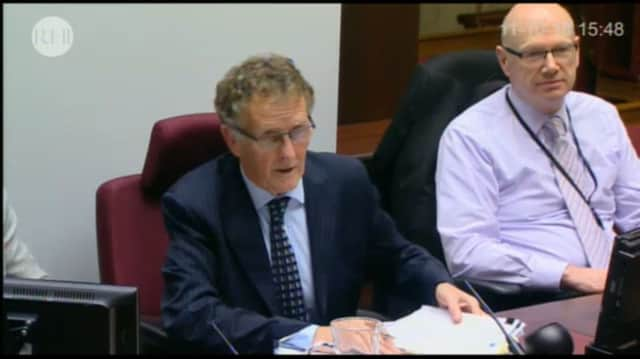Top civil servant defends DUP-SF Spad secrecy


In a further unflattering insight into the inner workings of devolution, Dr McCormick suggested that the “realpolitik” was that rules were routinely broken to get things done. He referred to Stormont as being “a very young set of institutions” with unique challenges and said that the behaviour which became normal, such as failing to keep basic records, was not “a cause for blame” but that “ten years is a very short time in terms of organisational behaviour”.
Inquiry chairman Sir Patrick Coghlin said: “Ten years is quite a significant time, I would have thought.”
Advertisement
Hide AdAdvertisement
Hide AdDr McCormick referred to a case where someone was tweeting information from within an Executive meeting. Sir Patrick asked why they had not been disciplined, adding that such leaks are “not the media’s fault”.
The civil servant said “there are rules – but the nature of our institutions makes them quite difficult to enforce”. Sir Patrick said he could understand why Dr McCormick was giving credit to DUP and Sinn Féin Spads who acted in a pragmatic way to get things done, “but by doing that they are ensuring that the rules and the regulations...are completely ignored. And there cannot be, from a public point of view, a positive perception of the political process if that occurs, I would have thought.”
Dr McCormick said he thought the Spads “were trying to work towards adherence, compliance and good behaviour, necessarily at times...with some aspects not recorded” but we “need to be realistic about that”.
Sir Patrick interjected to say: “You either have rules, or you don’t have rules.”
Advertisement
Hide AdAdvertisement
Hide AdDr McCormick faced scrutiny of the failure to minute a key meeting of senior civil servants with minister Jonathan Bell and his Spad Timothy Cairns in August 2015 when it was decided to delay the introduction of cost controls. There is now dispute between those who were present as to who said what.
He said it was a failure not to record the meeting, and if they had done so it would have both made it harder for both Mr Cairns to ask for a delay in cost controls and for officials to acquiesce in that delay. Sir Patrick said it was “a matter of concern that there isn’t a note”.
Under close questioning about how widely disregarded basic functions of public administration had been on his watch, Dr McCormick accepted that it was his responsibility “to have a system in place that works” and that wasn’t the case.
He added: “I accept personal responsibility for allowing that system to become what it was”.
He said that civil servants and politicians operated on the basis that “if you write something down it will probably appear in the newspapers” but that was “not a healthy way to work”.